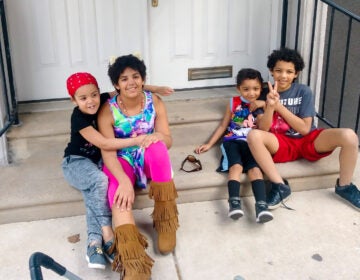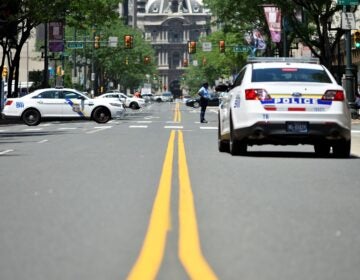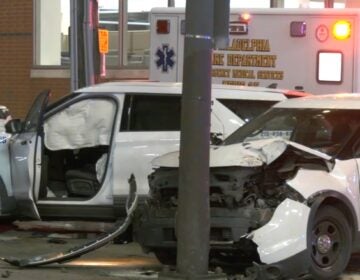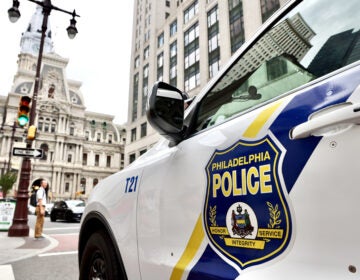Without a home and arrested: What I learned about police while homeless
When I lost my sublet and joined the community of people living at a fixed address, I found that police perceived me as a danger.
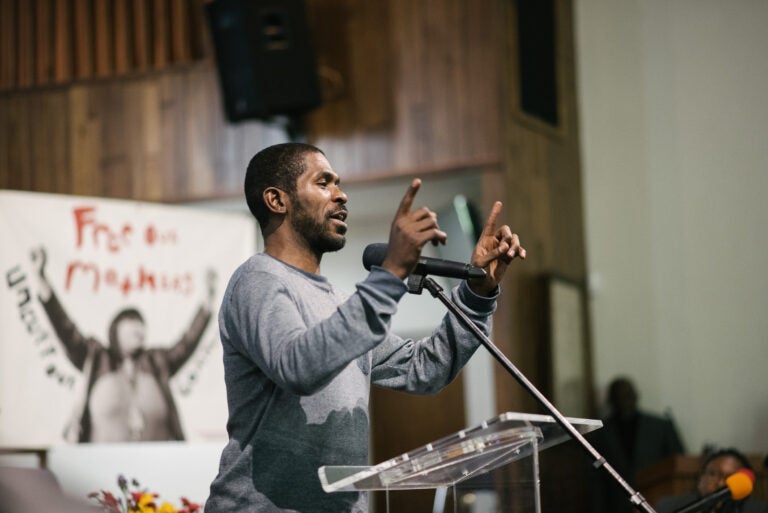
Dante Jones speaking at the People's Hearing at Eastern State Penitentiary in January. (Hannah Yoon)
This essay is part of a collection of stories exploring people’s relationships with policing across Philadelphia.
Homeless. It’s a very simple word to describe a huge problem.
I thought it was just a problem for philosophical debate until my longtime girlfriend and I wound up living in a tent under a bridge in Kensington. As someone who never thought I’d wind up there, I was amazed to learn how deep the sense of community ran among my homeless neighbors, who worked together to protect each other, and how many people from across Philadelphia were there to help us. But the police were not among them.
We are taught from childhood that police are there to protect us. All of us, even those without a home. But they had no interest in keeping homeless people safe — they saw us only as a danger, a threat to be eradicated. Even worse, in many ways they saw themselves as warriors, and us as the enemy.
Growing up Black in South Philly, I had no misconceptions about how the police could treat some people unfairly. I was a good kid who stayed out of trouble. But still I wound up being targeted by police as a teenager, dragged into the system as a witness in a way I barely understood at the time.
But nothing prepared for me what it would be like when I wound up living rough. In August of 2017, I was unemployed and lost my sublet when my landlord moved. My options for housing were all unacceptable — either a dirty room crawling with bedbugs or a shelter that would separate me from the love of my life.
At the time, the encampments in Kensington were just beginning to attract the attention of news organizations around the country. I already had a friend living there, so my girlfriend and I decided to try it for a week. It was our way of staying together. Then it became a life.
As lives go, it had advantages. I’m good at talking to people and soon I became a leader in the community. I helped the health care and social service workers find who was in need. I brought the concerns of my neighbors to people who could help us. I had a big tent and a little bit of cash.
But that life also had its problems — chief among them the police. They came through often, forcing us to move out from under the bridge for no apparent reason. If it was raining out, that meant a lot of folks got very wet and cold. They didn’t seem to care.
It got personal for me in December, when one officer came by looking for a Black man wanted on drug crimes. He wanted my tent out of the way and so he threw all of my possessions into the street. I objected and soon after he declared that I was the guy he was looking for.
With no drugs found, I was arrested on the spot.
I was released shortly after, but the next night the officer was back and locked me up again on the same charges, again with no drugs on me. This time my bail was set at $10,000, meaning I had to pay $1,000 for my freedom.
It might as well have been $10 million. It was inconceivable for me to have that money. This was a system that was supposed to ensure that I would make my next court date, but what it really did was sentence me to prison before I’d had a single day of trial.
But I was blessed. A few of my family members heard about the Philadelphia Bail Fund, which posted bail on my behalf and helped me get to each of my court hearings. That changed my life.
The charges I was being held on were eventually withdrawn — over a year later. I continue to battle in court over the first charges I was arrested on. If I were still in jail, I would have long since broken and taken a plea deal, pretending I was guilty even though I wasn’t. Only being free has given me the strength to keep fighting for what’s right.
Now I’m living in an apartment. I have a job helping to deliver services to people experiencing homelessness and recently began working also with the Bail Fund. I help people and am a credit to my community.
If the police and our bail system had their way, I would still be locked up. I would be costing this city money instead of helping feed it.
We need to put less money into greater numbers of police and jails and more money into supporting the “uns” of our city — the unemployed, the unfed, the unhealthy, the uninsured, the unhoused.
People who are experiencing homelessness are just that, people, just like you and me. Some of them are the brightest, most innovative people you could meet. Some are people with addictions who had everything and lost it all. Some are people who fled abusive situations, while others are people who simply lost or couldn’t find work. Police respond to the consequences of this neglect. They do not — and cannot — address the root of the neglect itself.
Addressing this neglect means investing fully in our communities, not in police and law enforcement. Only then, we will have a truly safe and healthy city – where everyone’s needs are met.
Dante Jones lives in North Philadelphia.

Subscribe to PlanPhilly
WHYY is your source for fact-based, in-depth journalism and information. As a nonprofit organization, we rely on financial support from readers like you. Please give today.



